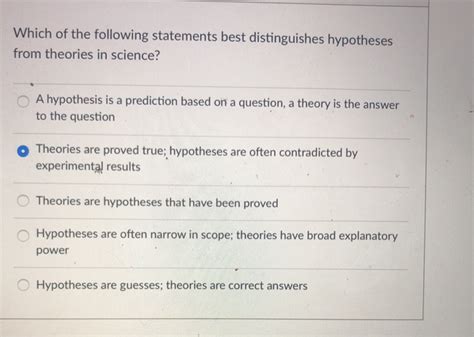A scientific theory is a well-substantiated explanation of some aspect of the natural world that is acquired through the scientific method, and incorporates facts, laws, inferences, and tested hypotheses. It is the foundation of modern science and is constantly being tested and refined as new evidence is discovered.

What is a Scientific Theory?
A scientific theory is a well-substantiated explanation of some aspect of the natural world that has been repeatedly tested and confirmed through the scientific method. It is the highest level of scientific understanding and is based on a body of evidence that has been gathered through observation, experimentation, and analysis.
Scientific theories are often complex and can take many years to develop. They are constantly being tested and refined as new evidence is discovered. However, once a theory has been well-established, it is considered to be a reliable explanation of the natural world.
Characteristics of a Scientific Theory
There are several key characteristics that distinguish a scientific theory from other types of scientific knowledge:
- It is based on evidence. A scientific theory is not simply a guess or a speculation. It is based on a body of evidence that has been gathered through observation, experimentation, and analysis. This evidence must be reliable and reproducible.
- It is testable. A scientific theory can be tested through observation and experimentation. This means that it is possible to make predictions based on the theory and then test those predictions through further observation or experimentation.
- It is falsifiable. A scientific theory can be falsified if it makes predictions that are not supported by the evidence. This means that it is possible to prove a theory wrong.
- It is generalizable. A scientific theory applies to a wide range of phenomena. It is not limited to a specific set of circumstances.
- It is explanatory. A scientific theory provides an explanation for the phenomena that it describes. It does not simply describe the phenomena, but it also explains why they occur.
Examples of Scientific Theories
Some of the most well-known scientific theories include:
- The theory of evolution by natural selection explains how new species evolve over time.
- The theory of gravity explains why objects fall to the ground.
- The theory of relativity explains the relationship between space, time, and gravity.
These theories have all been extensively tested and confirmed through observation and experimentation. They are considered to be the best available explanations for the phenomena that they describe.
Importance of Scientific Theories
Scientific theories are essential for understanding the natural world. They provide a framework for organizing our knowledge and for making predictions about the future. They also help us to develop new technologies and to solve problems.
The scientific method is a powerful tool for understanding the natural world. It allows us to test our ideas and to develop theories that are based on evidence. Scientific theories are the foundation of modern science and are essential for our understanding of the universe.
Conclusion
A scientific theory is a well-substantiated explanation of some aspect of the natural world that has been repeatedly tested and confirmed through the scientific method. It is the highest level of scientific understanding and is based on a body of evidence that has been gathered through observation, experimentation, and analysis. Scientific theories are essential for understanding the natural world and for making predictions about the future.
